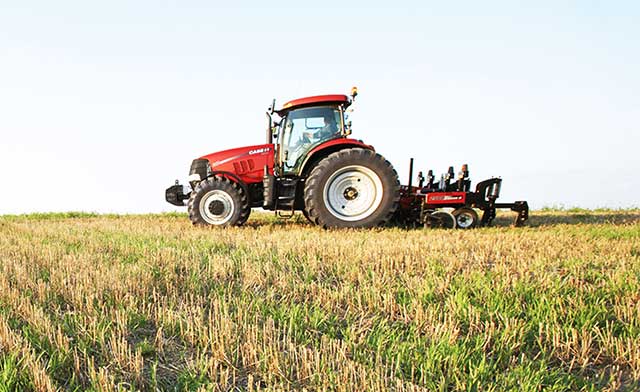With agriculture still such an important part of the United States economy, it’s vital for the farming industry to keep up with the inevitable climate changes that are occurring and will continue to occur in this country and throughout the world.
Food Technology
This $200 billion industry provides residents with food, crops, livestock, and seafood every year, according to the U.S. Environmental Protection Agency. New technologies have been emerging that make it easier to farm in areas that were previously thought to be impossible to cultivate. Adapting to climate change is a vital component to continuing to be agriculturally productive in the United States.

Understanding Climate Change
Because agriculture and fisheries depend on climate conditions that meet certain criteria, the shift of climate patterns could pose devastating effects on crops and wildlife. Although temperature and carbon dioxide increases can benefit crops in some areas of the country, other conditions—such as soil moisture, nutrient levels, and plentiful water—must be met. Ecosystems could be disrupted if warmer temperatures affect the habitats of fish, for example.
In turn, these shifts can also make it difficult for farmers to produce crops, catch fish, and raise livestock the way they are used to. Changes in farming practices, coupled with emerging technology that incorporates software and tools for viable production in new climates, are increasingly necessary to maintain agriculture production. Climate changes can significantly lower crop yields, with heat waves increasing the possibility of disease and a reduction in milk production for livestock, and warmer water affecting the timing of both migration and reproduction for fish.
Help from Technology and Adaptive Strategies
Farmers must be able to adapt if they want to keep producing viable food and crops. Because the United States’ food supplies rely in part on imports from other countries, it’s necessary to help farmers in remote regions of the globe adapt to changing climates as well. With the climate a threat to food crops like potatoes, beans, and bananas in East and West Africa, farmers are testing adaptation strategies that could boost crop production, such as trying out new plant breeds that may lessen the impact of climate changes, according to the International Food Policy Research Institute.

Safeguarding natural resources is one of the main objectives of Farming First, a coalition that promotes practical, actionable programs to boost sustainable agriculture development around the world. One way to implement this is to invest in technologies and techniques that enhance water-use efficiency, made possible by improved irrigation and water allocation systems, as well as conservation agriculture.
There are companies that can perform database development for water conservation by implementing simple data entry for large amounts of raw information, then making it easily understandable and actionable.
Many farmers rely on genetically modified seeds that can resist long periods of heat and dry air with no rain. More and more farmers are investing in new irrigation and drainage systems that drain off water but also save that water for use at a later date when needed.
The government helps fund these new systems because they control runoff from contaminating rivers. Software, too, helps farmers control their crops in new climates. The USDA puts out a software program called Virtual Grower, which farmers can use to calculate their greenhouses’ heating costs. As such, they can more accurately predict heating and energy use as it pertains to their exact location, their crops, and the design of their greenhouse.
Using technology and other techniques to safeguard crops and livestock is certainly not a brand new implementation, but each year advances are made that can offer better solutions to climate change.
This article was provided by Charity Bailey, recent Environmental Studies major and advocate for sustainable farming practices. If you’re a farmer looking for the latest, efficient machinery, Charity recommends you click here.
Technology's Impact on Farming in New Climates,





Meridith
Dec 30. 2013
I live in AR and I’ve been able to tell that the drought and horrible hot summers have been having an affect on local farmers. Farming in AR is a huge part of the states industry. Within the U.S. do you think that there are tax incentives or some other kind of fiscal benefit for farmers that utilize eco-friendly farming products/technology?
TechCrates
Dec 31. 2013
Thanks Meridith, our climate worldwide is getting more extreme with longer hot phases and vice versa. Hopefully eco-friendly technology innovations will be pushes in the trends further on, too 🙂
Kathy
Jan 30. 2014
These tips are really tremendous. I think it would be effective for all. Thank you for sharing with us. I hope everyone like these tips as me. Keep it up.
Anni
Feb 09. 2014
Use of appropriate technologies to produce healthy, organic, pastured food is a win/win – for the farmer, soil, consumers, animals, etc.
Donald
Mar 13. 2014
Agriculture is so important in our economy so it is vital that we are doing the most that we can to make sure it doesn’t fail us. The need for new inventive ways in dealing with climate change in farming is more necessary than ever. Your ideas sound like great ways to get around the climate problem and continue farming.
Wastewater
Jun 16. 2014
I’m glad to read your blog, Here you discussed a good tips which are useful to develop agriculture. We’ve to use new technologies by understanding the climate change. By using advanced technologies we can generate healthy food. This would be useful for all and thanks for sharing it. Keep up blogging…..